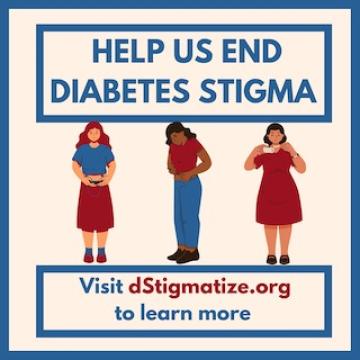dStigmatize: Ending Diabetes Stigma
diaTribe is launching a new website, dStigmatize.org, to provide a comprehensive resource for understanding, reducing, and ending diabetes stigma. Reducing diabetes stigma starts with education and advocacy.
People with diabetes are all too familiar with stigmatizing comments or jokes centered around their weight or food choices. That’s part of the reason why diaTribe created dStigmatize.org, a website designed to be a one-stop-shop for people to learn how stigma affects people with diabetes.
The website, which launched on February 22nd, explains what diabetes stigma is, why it’s harmful, and it provides personal stories and guidance on how to challenge stigma. If you are a person who communicates about diabetes – whether you are a healthcare professional, reporter or media professional, or a marketing and communication executive – the goal of dStigmatize is to make current resources available in one place. Over time the website’s content will expand to include resources for people with diabetes and their loved ones or anyone who wants to learn more.
Through a collaborative effort between diaTribe CEO Jim Carroll, diaTribe Associates Matthew Garza and Devanshi Gupta, in partnership with communications expert, Chris Barnes of Emphatic Communications, dStigmatize.org will be the first resource to focus primarily on addressing diabetes stigma in the United States.
Misguided comments like, “Should you eat that?” and misconceptions that equate diabetes with laziness can make living with the condition even more challenging. “Every day, those with diabetes work for their health in ways most people without diabetes can never truly understand. This disease is for the strong, not the lazy,” said Carroll.
Diabetes stigma exists everywhere, but a major source of it comes from the media and healthcare professionals, even if they don’t mean to be harmful. For the first phase of the website launch, dStigmatize aims to target people who communicate about diabetes – from leading healthcare professionals, to reporters and media professionals, to marketing and communication executives.
“When people feel blame and shame, their health can be undermined. In healthcare settings in particular, we know people are caring and mean well,” said Barnes. “Choosing to use words that reduce diabetes stigma is a habit of kindness and demonstrates compassion, support, and encouragement for people with diabetes.”
Research shows that stigma contributes to worse diabetes health outcomes. People with diabetes have said they feel embarrassment, anxiety, and low self-esteem as a result of experiencing stigma. In addition, the experience of being blamed or shamed for their diabetes can lead to feelings of isolation and a desire to hide their condition from others.
Stigma can also result in worse self-care and diabetes management. People with diabetes have reported injecting insulin only in restrooms or at home, making unhealthy food choices to avoid declining what is offered, and manipulating glucose logs to avoid criticism from significant others or health care providers. Learn more about the impact that stigma has on people with diabetes.

dStigmatize will include language resources that highlight the way stigma permeates how we speak about diabetes, a media guide for the accurate portrayal of people with diabetes, leading research articles on the impact of stigma, and other valuable resources. Over time, the team envisions that more resources will be created that help every person understand diabetes stigma, the impact that it has, and how we can begin addressing it.
“The goal of dStigmatize is to reduce the messages that unintentionally contribute to the stigma around diabetes by educating and empowering the people who write and talk about diabetes,” said Gupta.
The team consulted leading researchers working on diabetes stigma, language experts, communication professionals, and healthcare providers to comprehensively curate accurate resources and guidance on how to address stigma. They also collected stories from people with diabetes who had first-hand experiences with stigma to accurately portray the personal impact.
“By offering examples of how communicators and healthcare providers can talk about diabetes in a non-stigmatizing way, we hope to change the way diabetes is portrayed and create a larger shift in the language people use,” said Garza.
The idea of creating a stigma website was born out of diaTribe’s dSeries events in 2020 and 2021, which gathered leaders and key stakeholders from different corners of the diabetes ecosystem to discuss the problem of diabetes stigma. “That work showed that although good information existed about diabetes stigma and how to reduce it, the content was scattered across multiple organizations and research articles,” said Barnes. He saw this as an opportunity to create a well crafted and easily-shareable website.
Now that dStigmatize has officially launched, it is moving us one step closer to a point when all people with diabetes are able to get the care, respect, and compassion they deserve.
“The unkindness of stigma, the voice inside that creates feelings of shame and those external voices, intended and unintended, is what we hope to silence through our work,” said Carroll. “dStigmatize is the realization of that hope. The beginning of a better way to talk about people and their diabetes. One that awakens empathy in all of us so that the lives of people with diabetes are made better - Every. Single. Day.”


